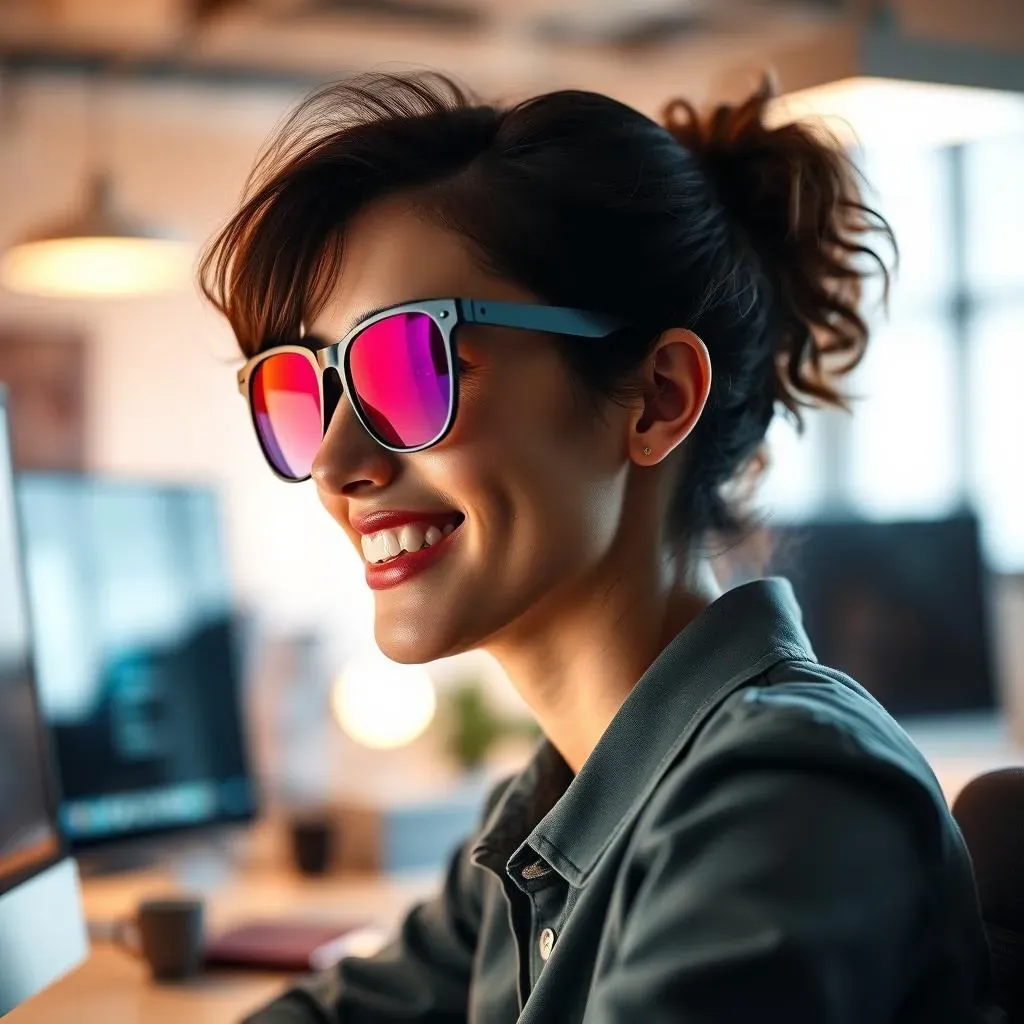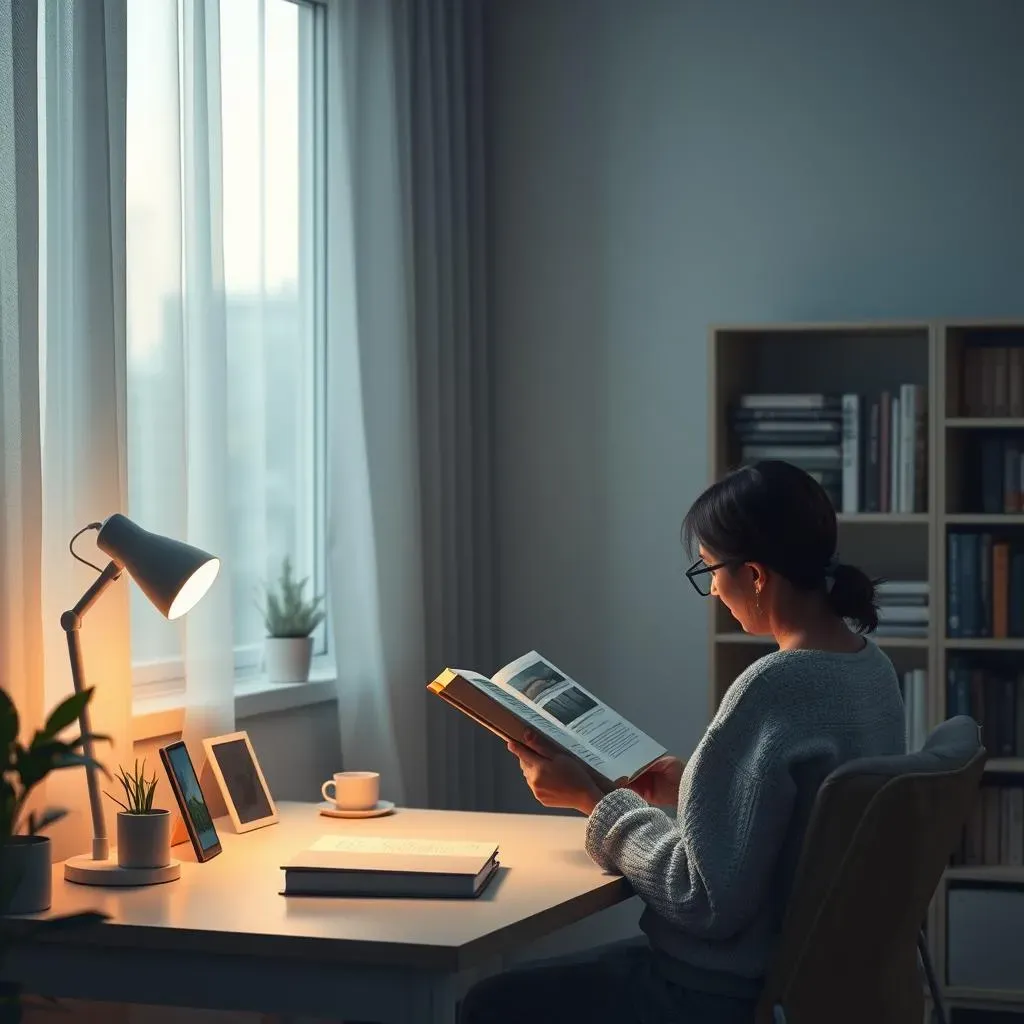Table of Contents
```xml
Introduction
Do your eyes ever feel like they're under a spotlight indoors? Fluorescent lights, computer screens, even the glow from your phone can be a real pain if you have sensitive eyes. You're not alone. Lots of folks find indoor lighting bothersome. Wearing regular sunglasses inside isn't the answer, making you look a bit odd and not really fixing the problem. This article will guide you through finding the right sunglasses for indoor lighting for sensitive eyes. We'll explore why those indoor lights cause discomfort in the first place. Then, we'll look at what to consider when choosing indoor eyewear. Finally, we'll offer some tips to make your indoor environment easier on your eyes, beyond just wearing sunglasses. Ready to say goodbye to indoor light sensitivity? Let's get started. ```
Why Indoor Lights Bother Your Eyes
Why Indoor Lights Bother Your Eyes
The Type of Light Matters
Ever noticed how some indoor lights feel like tiny suns glaring at you? It's not just your imagination. Many indoor lights, especially those old-school fluorescent tubes and some LED bulbs, pump out a lot of blue light.
Think of it like this: white light is actually made up of all the colors of the rainbow. Too much blue light can be harsh on your eyes, kind of like listening to music that's all high notes and no bass. It can cause strain and make you squint, even if it doesn't seem super bright. It's like that one kid in class who's just a little too loud – annoying after a while.
Your Eyes Are Unique
Now, not everyone gets bothered by the same lights. Some people's eyes are just more sensitive than others. It's like how some folks can handle spicy food, and others start sweating after a tiny bit of pepper. If you have photophobia, also known as light sensitivity, you might find even normal indoor lighting to be really uncomfortable.
Also, if you've got light-colored eyes, you might be more sensitive. Think of your eyes like curtains – darker curtains block more light. Lighter eyes let more light in, which can be a problem when there's too much harsh light around. It’s not a flaw, just how you’re built. Check out these sunglasses for light eyes if you're curious.
Picking the Right Indoor Sunglasses
Picking the Right Indoor Sunglasses
Lens Color is Key
So, you've decided regular sunglasses are too dark for indoors. Smart move. But what kind of lenses should you be looking for? The color of the lenses makes a big difference. Think of it like choosing a filter for a photo – it changes how you see things.
For indoor use, you don't want super dark tints. Instead, look for lenses with a lighter tint that can still filter out that harsh blue light. Rose, amber, and yellow tints are often good choices. They can help increase contrast and make things look a little warmer, which can be easier on the eyes. It's like putting on a cozy sweater for your eyeballs.
Lens Color | Benefits | Good For |
|---|---|---|
Rose/Pink | Reduces eye strain, blocks blue light, improves contrast | Computer use, fluorescent lighting |
Amber/Yellow | Increases contrast, blocks blue light | Low-light conditions, reducing glare |
Light Gray | Reduces overall brightness without much color distortion | General indoor use |
Think Light, Not Dark & Other Perks
Don't go for the super dark shades you'd wear on a sunny beach. That's overkill for indoors and might even make your eyes work harder to see. Look for lenses that let in a good amount of light while still cutting down on the glare. Polarized lenses can also be helpful, especially if you're dealing with reflections from screens or shiny surfaces. You can learn more about polarized options.
Also, consider features like anti-reflective coating. This can reduce reflections off the back of the lenses, which can be distracting. It's like having a ninja for your glasses, silently fighting off annoying light. And hey, make sure they fit comfortably! You don't want sunglasses that are constantly sliding down your nose while you're trying to work.
Making Indoor Lighting Easier on Your Eyes
Making Indoor Lighting Easier on Your Eyes
Change Your Light Bulbs
Sometimes, the easiest fix is swapping out those harsh bulbs. Think about it – if a light is bothering you, why not change the light itself? Look for LED bulbs that are labeled "soft white" or have a lower color temperature (around 2700K to 3000K). These give off a warmer, yellower light that's much gentler on the eyes. It's like trading a spotlight for a cozy lamp.
You can also try using lamps with shades to diffuse the light, spreading it out instead of having it beam directly at you. It's all about making the light softer and less intense. If you're really struggling, you might want to check out options for photophobia that offer more specialized light filtering.
Adjust Screens and Take Breaks
Our screens are big players when it comes to indoor light. Lowering the brightness on your computer, phone, and tablet can make a huge difference. Most devices have a setting for "night mode" or "dark mode" that reduces the amount of blue light they emit. Give it a try – your eyes will thank you. It's like putting sunglasses on your screen!
Also, remember the 20-20-20 rule: every 20 minutes, look at something 20 feet away for 20 seconds. This gives your eye muscles a break and can reduce eye strain. Think of it as a mini-vacation for your eyes. And if you spend a lot of time looking at screens, you might want to consider computer glasses for extra protection.
Consider Your Surroundings
Believe it or not, the way your room is set up can affect how light hits your eyes. Try positioning your desk or seating so you're not facing a bright window or having light reflect directly off a shiny surface. Sometimes, just a small change in furniture arrangement can make a big difference. It's like finding the perfect spot in the shade on a sunny day.
If you're still having trouble with indoor lighting, it's always a good idea to chat with an eye doctor. They can help figure out if there's an underlying issue making your eyes extra sensitive and offer personalized advice. Think of them as the expert guides for your eye health. They might even have some specific recommendations beyond just wearing sunglasses.
Wrapping Up
Dealing with light sensitivity indoors doesn't have to be a struggle. Choosing the right sunglasses for indoor lighting for sensitive eyes can make a real difference. Remember to think about lens color and how much light they block. Also, making a few changes to your indoor lighting can help a lot too. So, go ahead and find those perfect indoor shades and make your eyes happy!
